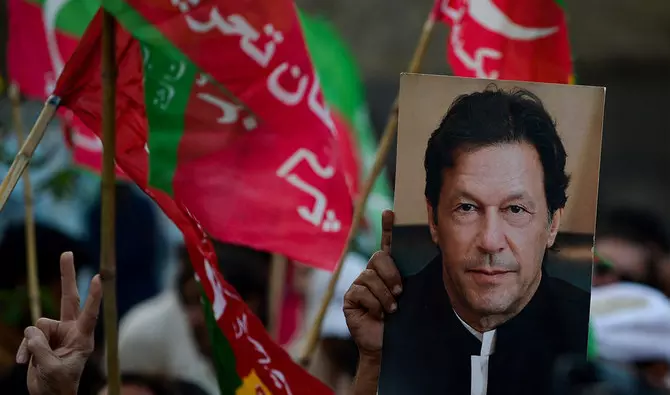Imran Khan's party eligible for reserved seats in Parliament, provincial assemblies: Pak SC

Imran Khan's party eligible for reserved seats in Parliament, provincial assemblies: Pak SC (File Photo)
Islamabad: In a major legal victory for Pakistan's jailed former prime minister Imran Khan's party, the Supreme Court on Friday ruled that his Pakistan Tehreek-e-Insaf party is eligible for the allocation of reserved seats for women and minorities in Parliament and in the provincial assemblies.
The Sunni Ittehad Council (SIC) had filed a plea challenging the Peshawar High Court (PHC) decision upholding the Election Commission of Pakistan's (ECP) move to deny its share in reserved seats in the National Assembly and provincial assemblies.
A 13-member full bench headed by Chief Justice Qazi Faez Isa heard the case and the ruling in the keenly awaited judgment is viewed as a major setback to Prime Minister Shehbaz Sharif's ruling coalition.
Candidates backed by Khan's Pakistan Tehreek-e-Insaf (PTI) party, who had contested and won the February 8 elections as independents after their party was stripped of its election symbol, had joined the SIC to form a coalition of convenience.
The apex court on Friday annulled the decision of the PHC and also declared the decision of the election commission null and void, terming it against the Constitution of Pakistan.
[The] withdrawal of election symbol cannot disqualify a political party from elections, the court declared, referring to the election commission not allowing the PTI to use the cricket bat as its election symbol.
The PTI was and is a political party, the bench ruled. Khan, a cricketer-turned-politician, founded the PTI in 1996.
The decision, announced by Justice Mansoor Ali Shah, was made based on a majority of eight judges.
Meanwhile, reacting to the apex court's verdict, PTI said that the party "has been hopeful that the justice will be served in the end, given there was no provision in the constitution of Pakistan, that could strip a party off its proportionate quota neither the quota could be allotted to other parties.
A post from the PTI's official X account also demanded the immediate resignation of Chief Election Commissioner Sikander Sultan Raja for violating [the] Constitution of Pakistan.
Imran Khan's former aide Fawad Chaudhry echoed the party account's sentiments, also demanding the resignation of the chief election commissioner in a post on X. He said the PTI should demand ECP resignation after SCP has now official charge-sheeted ECP.
The party spokesman Raoof Hassan also extended his hearty congratulations to the PTI on X, lauding the Supreme Court for breaking the barriers of intimidation. This is only the beginning of a long haul till we reach the final destination when Imran Khan shall take over as the Prime Minister of Pakistan, he said. "Soon, very soon."
Earlier, after concluding the hearing on Tuesday, the 13 judges spent two days in mutual consultations before announcing the verdict.
The court initially announced that a three-member regular bench headed by the chief justice would announce the verdict at 9 am, but shortly after that, the timing was changed and the bench announcing the verdict was changed when it was announced that the original 13-member bench would issue the judgment at noon.
The dispute about the reserved seats was related to the rejection of a SIC plea by the ECP to award its share in the 70 reserved seats in the National Assembly and another 156 in the four provincial assemblies.
The PTI party could not contest the February 8 elections as the ECP rejected its intra-party elections and deprived it of the bat symbol for contesting the elections as a party.
Hence it was not eligible to claim the seats reserved for women and minorities that are awarded to the winning parties based on proportional representation.
So its candidates, who had won independently but with the support of PTI, were asked by the PTI leadership to join a SIC to form a parliamentary party to claim reserved seats.
The joining of PTI lawmakers made the SIC prominent, which otherwise was a dormant entity.
The ECP had rejected the SIC plea for reserved seats on the pretext that it had not contested the elections as a party and only got strength when the PTI-backed independently elected candidates joined its ranks after winning the elections. Its appeal against the ECP decision in the Peshawar High Court was also turned down in March, forcing the party to file a challenge in the Supreme Court.
In a rare move, a 13-member full bench presided over the hearing and announced the verdict on the insistence of the SIC lawyers.
Earlier, the Supreme Court on May 6 in a major relief to the PTI suspended the Peshawar High Court's decision about rejecting the SIC plea. Following the ruling, the ECP on May 14 suspended the victory notifications of 77 candidates, who belonged to other parties and were declared successful on the reserved seats.
The final ruling by the top court in the case decided the fate of those 77 reserved seats. Though it may not change the current power structure, the changes in the overall number game in the assemblies may impact the law-making in the country.
( Source : PTI )
Next Story

